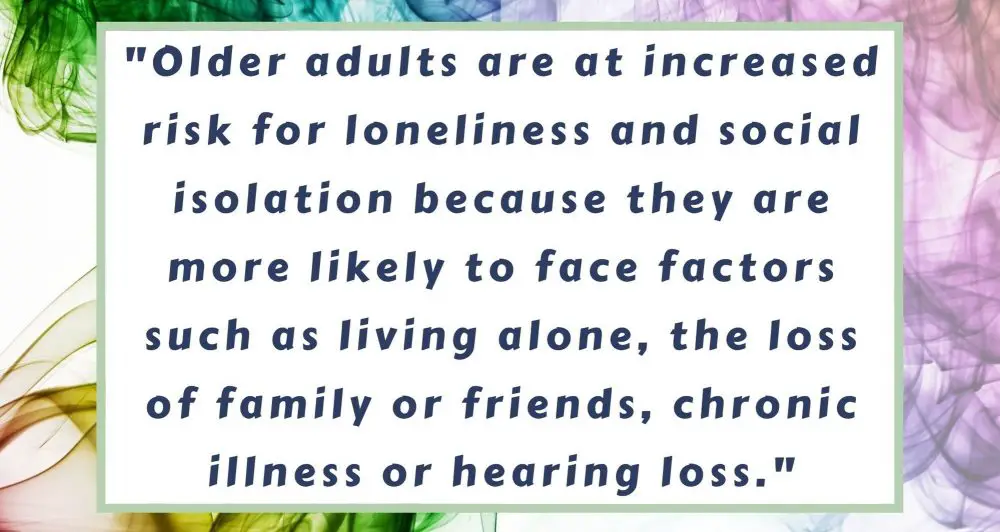Overwhelmingly, almost everyone wants to live out their years in their own home. In spite of this, well-meaning family members often decide dear mom or dad would be better off in the nearest old folks’ home.
This raises an important question: should an elderly parent or loved one age in place?
Aging in place can be the best option for seniors who want to remain in their homes. This promotes independent living when concerns such as daily needs, safety and a support network are addressed.
The majority of people prefer remaining in their home. According to a 2021 survey by Capital Caring Health, nearly 90% of Americans age 50 or older prefer to stay where they are.
In fact, when viable, this is often the best choice. Uprooting them from the home they know and love can create stress and anxiety. Instead of viewing it as a positive change, they might feel they’ve outlived their usefulness or become a burden.
Furthermore, this can also be associated as the final step toward end of life. In light of these dynamics, it’s understandable why so many are resistant to leave their homes.
This is an important decision which needs to be fully thought out and discussed.
Discussing Aging in Place with A Loved One
How do you broach the topic?
There’s a high probability it’ll be an awkward conversation as this is new ground for both of you. Discussing the aging process and whether or not they should remain in their home isn’t the most pleasant of conversations.
Perhaps the best way to start is expressing your concern for their well-being. Tell them you care about their health and happiness. Encourage them to share their thoughts, feelings and pay close attention to what they say.
Thinking back on my step father (which I’ll expand upon later), things didn’t go well. He flew by the “seat of his pants” his entire life. In spite of my best efforts, he made (or didn’t make) some not so great decisions which impacted his final years.
In a best-case scenario, this might be something on their mind. Perhaps they’re uncomfortable bringing it up and this is just the nudge they need to start the conversation.
Why The Reluctance to Share Information?
Having a discussion with an elderly loved one or parent about their situation and personal finances is about as much fun as getting a root canal! Trying to get a straight answer out of them might be akin to asking for state secrets!
Thinking back to my own parents, there’re a few reasons for this reluctance:
Tip: Many seniors become more set in their ways. Avoid arguing with them or telling them what to do.
Advantages Of Aging in Place
Unless my health was declining or I required daily living support, I’d sooner not be shunted off to some senior residence! This aligns with what most people want. Some of the advantages of remaining in your home include:
There’re numerous advantages of remaining in the home. Whether it be the traditional family home or downsizing to something smaller and easier to maintain.
In addition, proximity to medical facilities and other services/amenities should be considered.
This really is about quality of life and at some point, it may become untenable. When circumstances and/or conditions change one needs to weigh the advantages against the disadvantages.
Disadvantages Of Aging in Place
Everything becomes more problematic as we get older and health issues creep in. These could include physical issues such declining mobility, vision/hearing loss or breathing difficulties.
If cognitive decline occurs, this can further exacerbate everything else.
Unfortunately, when warning signs are hidden or ignored, this slow decline can rapidly snowball into dire consequences. This is exactly what happened to my step father.

While we need to respect our loved ones’ wishes, we also want to make sure they’re aware of the pitfalls. Frequently they're unaware or downplay the warning signs. When ignored, these can lead to major problems down the road.
Some of the disadvantages include:
Depending upon the severity, many of these disadvantages can be addressed. Equally important is recognizing when assisted living or long-term care is more appropriate.
Loneliness And Social Isolation
Without a strong social network, your loved one is at risk of experiencing loneliness and social isolation. Research from the CDC reveals:

With almost a third (27%) of American adults over the age of 60 living alone, extra attention is required to ensure they remain socially engaged.
An underlying factor can be grieving the loss of a spouse or close friend. In addition, mobility issues or loss of hearing/vision can also limit interactions with others.
Health Risks of Loneliness and Social Isolation
Research reveals the risk of mental and physical health decline increases in the absence of meaningful social interaction. The CDC further presents strong evidence linking several health risks with loneliness and/or social isolation:
Thoughts To Consider
Some seniors have a strong social network easily making friends. Others could be more introverted and find it awkward to approach people. Our post, how to make friends in retirement, provides insights on this challenging issue.
Other tips to keep socially engaged include:
Nutrition
You might be shocked to hear over half (56.3%) of people 60+ in the US experience malnutrition. According to Springer Link, not only are they at risk of malnutrition, 5.9% are actually malnourished!
Cooking for one is hard enough, yet maintaining a proper diet is critical. Other factors affecting nutrition include changes in medications, lack of energy/appetite, limited access to grocery shopping and loneliness.
Keeping on top of all the moving parts is critical to ensure your elderly parent is getting all the nutrition they need. They’re going to need help especially when there’s a lack of energy or appetite.
Apathy can set in and the mindset can shift to “what does it matter anyway?”.
Thoughts To Consider
There are several steps to ensure a healthy, nutritious diet. These could include:
Senior Friendly Dwelling
A senior-friendly home is one which is safe and easy to maneuver in. Problems with traditional homes include difficult to navigate front door thresholds, stairways, getting on and off the toilet or bed and bathing.
All these can become obstacles leading to a slip or fall. According to the CDC, the number of falls reported for older adults each year is 36 million resulting in 32,000 deaths.
There are numerous stories of people breaking their hips, arms or other limbs. Some end up needing replacements. Not a fun surgery!
Many older adults downsize from a family home to something smaller and more manageable. Not only might it be perfect for them, they also avoid expensive upgrades and repairs.
This could be to a condo/apartment or a 55+ community. As we discuss in our post, disadvantages of retirement communities, you’ll also want to do your research before jumping in.
Thoughts To Consider
Contrary to popular opinion, falls are not a normal part of the aging process. Some of the ways minimizing risks include exercise to strengthen muscles, changing medications which cause dizziness and home safety modifications.
These renovations can consist of:
Keep in mind, these modifications can range in cost from a few hundred to thousands of dollars. And, the majority of the time, 80% of the cost is out of pocket. The National Association of Home Builders offers a comprehensive check list of renovations.
Tip: An excellent resource is Homemod, providing a state-by-state breakdown of home modification programs for seniors.
Support Network
Success aging in place requires a support network. For a healthy active senior, this might be someone nearby they can depend on in an emergency. Depending upon the circumstances, this could be a family member or close friend/neighbor.
In other instances, additional support will be required. There is a wide range of services available such as:
Thoughts To Consider
This is where a realistic appraisal needs to be made. Some questions to discuss include:
Whichever support system is put in place can directly influence quality of life. In addition, as needs change and more support is required, costs will likely increase.
Medicare has a search tool that helps you find home health care options in your area. Also, some home care expenses may be covered through Medicare.
Tip: Elder Care is a federal website connecting with support services in your area.
Management Of Finances
Personal finances are an area often neglected. At one extreme there may be little to no savings. Or, there may be significant savings locked away in ultra conservative low yield investments.
This is when a certified financial planner (CFP) may be invaluable to rebalance these portfolios.
Seldom is there any budgeting for upgrades, renovations or home repairs. When it comes time for in-home care, where’s that money to come from? All this raises the question, is aging in-place the best choice when no money is available?
And, while it may be cheaper to remain in the home, as we’ve all seen, things can quickly change.
One option to consider is the Federal Housing Administration home equity conversion also known as a reverse mortgage. This would free up home equity for necessary expenses.
A Growing Issue - Senior Scams
Seniors are constantly being targeted by unscrupulous characters attempting to bilk them out of their money.
According to a 2020 FBI Report, seniors were scammed for almost $1 Billion last year with an average dollar loss of $9,175. The bizarre aspect is many seniors trust complete strangers making themselves vulnerable.
The majority of these scams are initiated over the phone with most being highly polished and convincing. Our post, senior scams, goes into more detail about this sad state of affairs and how we almost got scammed ourselves.
Thoughts To Consider
When having this delicate talk, reassure them you just want to make sure they’re taken care of and you’re there to help. Understanding their financial situation is critical to putting the necessary supports in place.
They’ll probably be very leery about sharing details. The older generation wasn’t strong at talking about finances. Patience and understanding will go a long way to uncovering their position.
Some things to help them be financially secure could include:
Closing Thoughts
An elderly parent(s) or loved one might believe staying in their home is what they want. There are numerous benefits to this when it promotes an independent lifestyle where their daily needs, safety and a support network are addressed.
Respecting their wishes is generally the best course of action. However, there can be major disadvantages when matters are overlooked or ignored. This isn’t a one-time decision as things will change over time.
The very last thing my stepfather wanted was exactly what happened to him. Instead of a stress-free happy retirement, events overtook his life, hastening his decline.
That’s why it’s imperative to discuss and have a comprehensive plan. This really is about quality of life and making the most of these years.


Any suggestions for people living hundreds of miles away from their aging relatives?
Keeping in touch is really important to minimize their feelings of loneliness or isolation. Phone or have virtual calls (Zoom, Facetime) with them if that’s an option. They’ll feel loved and it’ll give you a sense of peace.
The next aspect is ensuring they have an adequate support network close to them. You might want to check out Elder Care. It’s a federal website that could connect you with support services in your relatives area.
Best of luck with this!